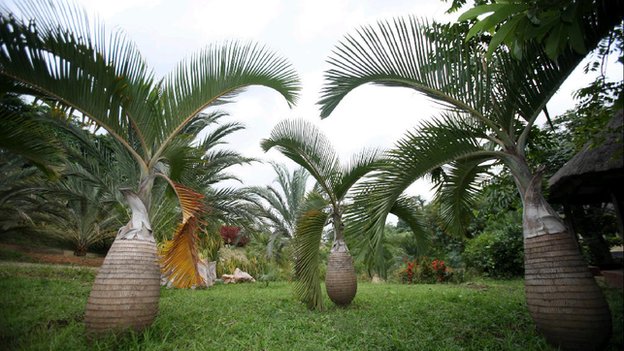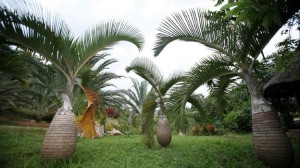
She has the largest private collection of plants in Nigeria, with more than 2,000 trees and shrubs, and 400 types of palm growing in her garden, built up over eight years in the capital, Abuja.
The 72-year-old imports many of Nigeria’s endangered plants as seeds – her aim is to conserve, propagate and disseminate forgotten indigenous plants. She often stops her car and disembarks to conduct a search whenever she drives past an area with dense foliage; she also organises plant expeditions to remote villages around Nigeria.

“There are plants everywhere but palms have a special aura,” she says. “They have the ability to transform an environment in a way that no other plant can.” For some people in temperate parts of the world, the palm tree symbolises a tropical, relaxing holiday, but for those who live in places where they grow, such as Nigeria, they are a vital economic resource.
Products as diverse as oil, sponges, brooms, wine and raffia are all made from the trees. Palm products also form the raw material for other essential items, such as soap, salt, food and medicine. However, Nigeria’s reliance on crude oil means the palm has long been neglected, and many local species are in danger of becoming extinct.

There are currently more than 2,000 species of palm around the world but, nowadays, only about three to five are common in Nigeria.
“Half of the world’s palms originate in Madagascar, but Africans are not interested,” Mrs Muhammed says. “It’s the Westerners who go there in search of plants that are going into extinction, which they then take back to their own countries.”
‘Bewitched’ plants
Nigeria was the world’s leading producer of palm oil during the period of British rule, while West Africa was the centre of the palm industry.
In the 1870s, colonial administrators took palm seedlings from West Africa to Malaysia. Today, Malaysia is the global leader in oil palm plantations, production and export of palm oil products. Its output, combined with that of Indonesia, far exceeds the quantity of palm oil produced by the entire continent of Africa.

Some members of the expedition had carried along personal items in black polythene bags; they tore pieces from these to use as moisture barriers on the targeted stem. The group had also brought along a photographer, who captured the entire procedure on film.
Six weeks later, Mrs Muhammed sent the photographer back to record the progress of the newly rooted plants, but he found they had all been felled by villagers. Seeing new plants rooting on the stems alongside the patches of black plastic, in terror they had convened a meeting with their village head during which it was concluded that the plants were bewitched.
‘Commercial potential’
Mrs Muhammed says many plants that are considered indigenous to other parts of the world can be found thriving in remote Nigerian forests, where no foreigner could ever have planted them. She bemoans Africans’ general lack of interest in such matters, which leads to other regions laying claim to native species.
But Nigerians can learn more about their flora and fauna at the first site set up by Mrs Muhammed in the 1990s just outside Lagos city, the 30-hectre (74-acre) Murtala Muhammed Memorial Botanical Garden. It was named after her late husband, a popular former military head of state who was assassinated in 1976; she also has a one-hectare garden in the Lekki area of Lagos.
However, neither of these gardens is as fully stocked or dedicatedly tended as her Abuja garden, with its botanical and palm collection, known as a palmetum. As I accompanied Mrs Muhammed on a tour of her 20-hectare Sarius Palmetum and Botanic Garden, she pointed out some endangered plants:
- Native to Nigeria, the pepper fruit, dennettia tripetala, which not only has a distinct aroma and strong spicy taste but has been found to contain chemicals that can combat glaucoma.
- The succulent sea grapes, or coccoloba uvifera, which once lined the beaches in Lagos.
- The juicy pitanga cherry, eugenia uniflora, which forms thick hedges that were a favourite choice for landscaping homes during my childhood.
“Our government thinks agriculture is only about corn and cassava,” says Mrs Muhammed. “But there is a lot of commercial potential in these other plants.”
‘Embarrassing’
She adds that most people who visit her gardens are more interested in purchasing plants purely for their aesthetic value. And so, in an effort to get people to cultivate them, she ends up giving out the less attractive endangered plants free of charge.

She also encourages groups of pupils who come on excursions to her garden to plant a palm to which they can affix the name of their school. Mrs Muhammed describes her dedication to plants as a “hobby that turned into an occupation”.
She originally trained as a dental therapist. Her husband bred fish, aquatic snakes and birds, but she discovered her own love of nature after he died, when she moved into a new house that had a garden.
Over the past five years, she has paid regular visits to Hawaii and Tahiti, to learn how these beautiful islands have managed to preserve their distinct flaura and fauna.
She also volunteers at the Fairchild Tropical Botanical Garden in Florida, and attends international botanical conferences. “I’m usually the only black African in attendance at some of these conferences,” she says.
“I find it a bit embarrassing. For years, I’ve been trying to form the palm society of Nigeria but no-one is interested.” In addition to its vast collection of plants, the Sarius Palmetum hosts an art gallery, a plant nursery and six garden shops.
One of the greatest challenges Mrs Muhammed’s project has faced is finding good hands. Most of the botany degree holders in her employ arrived with a wealth of theory but almost no practical knowledge, so all her staff had to be trained from scratch.
But she has resisted the advice of those who believe she is better off employing expatriates like many other agriculture organisations in Nigeria do. “I would rather manage with Nigerians. In the long run, we will gain from it,” she says.
Her future plans include a section for the visually impaired, called the garden of the senses, with plants that have special textures and strong smells. She is also working on a pictorial book about Nigeria’s plants, to pass on her knowledge to a new generation in the hope they will be inspired to continue her work.
By Adaobi Tricia Nwaubani


